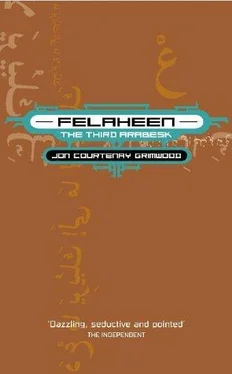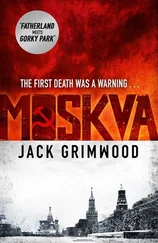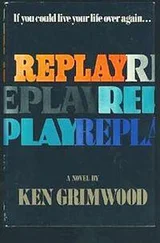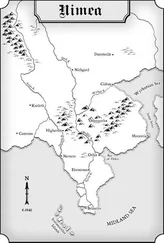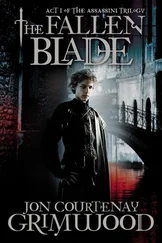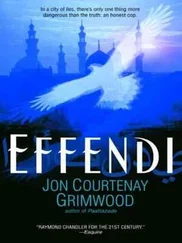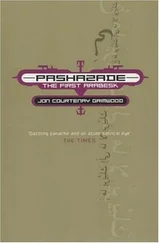He was advertising pâté dentifrice . As used in Paris.
"Where are we going now?"
"Cap Bon," said Raf. "To question the Marquis de St. Cloud."
It said much for Murad's cool that he didn't ask why his half brother had the Bugatti's headlights switched off. Recalibrating his eyes, Raf glanced in the mirror and saw Murad lit by screen glare from Hani's pink plastic laptop.
"Can you turn the screen down . . . ?"
"Why?" Her voice was petulant. As if she still hadn't quite forgiven him for one or more of the many things for which he still needed her forgiveness.
"Because too much light makes driving difficult."
"If I must," said Hani and flicked off her laptop. Adjusting the screen was much too easy an option.
Raf didn't tell Hani his other reason. That somewhere above them would be a UN spysat capable of tracking their journey from the farmhouse to Cap Bon. If they were lucky, that was. If they were unlucky, then the satellite had probably just captured every one of Hani's keystrokes.
He drove in silence. Letting darkened walls and hedgerows flow around him until the dirt track became a minor road, then something that actually had central lines. Shortly after that came the périphérique around Tunis, the city flickering by in a smudge of suburbs as the huge Bugatti burned up the outside lane, lights out and its three passengers shadows held in darkness, like ghosts going on holiday.
One of the cardinal points of the Emir's work creation programme was that everyone in Ifriqiya should have a job. And if that meant more road sweepers, line painters or ditchdiggers than there were roads then so be it.
What Ifriqiya needed, of course, at least in the opinion of every visiting dignitary, was fewer donkeys and wider roads. Only the land lost to build the roads would, when added together, shave hectare after hectare off the country's reserve of perfectly good smallholdings. On the Emir's orders, a survey had been carried out after some commissar with mining interests in Gafsa had complained that trucking phosphate was becoming increasingly uneconomic.
In response to a hint from Moscow that the CCCP might help Tunis fund a programme to build new motorways, the Emir sent them the address of every family who'd lose land and invited Moscow to write to each, explaining why it was necessary.
To the reply that this would be pointless, since most of those would undoubtedly be unable to read, he pointed out that the literacy rate in Ifriqiya was slightly higher than western Russia as a whole, and at least 25 percent above that of Georgia, which was where both the commissar and the Soviet president originated.
The roads remained unwidened, still lined with prickly pear except in the far south, where the ground was too barren to grow even that.
"What are you thinking?" Hani asked, her voice no longer sullen. On her lap the computer balanced on top of Ifritah's cat basket. Now forgotten.
"About prickly pears," said Raf.
Hani nodded, as if that was to be expected. "The roads," she said, "and Moscow's plan to widen them. It's mentioned in the official guidebook."
"Probably," said Raf. From what he'd just seen, Emir Moncef was quite capable of having it included just to signal his independence from the only country still willing to trade openly with Ifriqiya.
"How do you two do that?" Murad demanded, his tone more interested than aggrieved.
"Do what?" Hani and Raf asked together.
And the answer was he didn't know. Raf accepted that he'd no more understood what his own mother was thinking than she'd known what hid inside his head. They had remained, from his birth until her death, two strangers separated by common blood and long silences: every glance between them was embarrassed, each hug brief and gratefully cut short. If ever he took her hand she flinched. Every time she touched him he froze.
It was a relationship safe only when conducted at a distance by e-mail or letter. So maybe Zara was right and he really was the last person to be looking after a troubled, hyperintelligent, unquestionably lonely small child.
Alternatively, he was ideal.
"You okay?"
Raf glanced in the mirror and saw Hani watching intently.
"Thought not," she said. One thin hand came up and gripped his neck, small fingers digging into muscle knots on both sides. "Twist your head," said Hani.
Raf did and heard bones crunch as something slid back into place. "Donna does it," she said, "every time I get a headache."
"You get many headaches?" Murad asked. And Raf realized he had no idea of the answer either.
She looked at Murad. "Since my uncle arrived," said Hani, "life's been one long headache." She smiled as she said it and neither of the other two quite noticed she'd avoided answering Murad's question.
"Almost there." Hani's announcement came just before Raf turned right between two houses and edged his way through a tiny village, headlights still unlit. She'd been collecting old advertising murals and so far she had a Dr. Pierre , two Fernet-Branca (la digestif miraculeux) , a faded blue dubo, dubon, dubonnet and one for underwear by Rhouyl , which, if she understood the faded French correctly, was guaranteed to induce health-giving static.
Staring from his window of the still-moving car, Murad tried to focus on the world outside. Just enough moon was filtering through the clouds to bathe the soft slopes of Cap Bon in a ghostly fuzz which was almost, but not quite, light. "How do you know that?" he asked.
Hani shrugged. "I just do."
Around them were orange groves in blossom, wizened pine trees, the occasional villa set back from the coast and even a wrought-iron bandstand. The spindly confection set down on a promenade overlooked blue-painted fishing boats that bobbed at anchor.
On the wall opposite, another notice, paper this time, reminding everyone that falcons could not be captured for training until the second week of March. The warning was pasted next to an older poster advertising the festival de l'épervier , dated from June the previous year. Light from a bakery window lit both and through its glass could be seen an old man in vest and floppy trousers kneading dough . . .
They ate their brioche from the bag, the pastry still warm enough to make the paper turn translucent down one side. The old man had been polite. Totally unsurprised to be disturbed at 3:00A .M. by a man and two children wanting food. And he threw in two tiny tarte tatin for Hani and Murad, smiling and nodding as he shooed the three of them towards the door.
"Work to do," he explained.
Raf nodded.
What passed for a plan in Raf's mind the fox would undoubtedly have dismissed as cage circling, the dysfunctional repetition of a narrow range of gestures. Have an idea, repeat it endlessly until all value is wrung from the original . . . With a sigh, Raf straightened his shoulders and pulled a bell handle.
Welcome to the Andy Warhol school of detective work.
Somewhere inside Dar St. Cloud a Victorian bell tipped sideways far enough to hit a silver clapper and the faintest tremor of that blow whispered back through the wire to reach Raf's fingers. The bell was an affectation. One made worthless by two small Zeiss cameras that swivelled, cranelike to catch Raf and his companions in their gaze.
Retuning his eyes, Raf shifted through the spectrum. Checking out what he already knew, the three of them were blanket-lit by infrared and targeted at waist height by pinhead lasers. He could see tiny lenses set into the portico walls. Then the door opened and Raf forgot about armaments. Only panic could make the Marquis do something that stupid and this was not a character trait associated with Astophe de St. Cloud, recognized bâtard of the French Emperor and a man who'd once offered Raf more money than he could even begin to imagine.
Читать дальше
